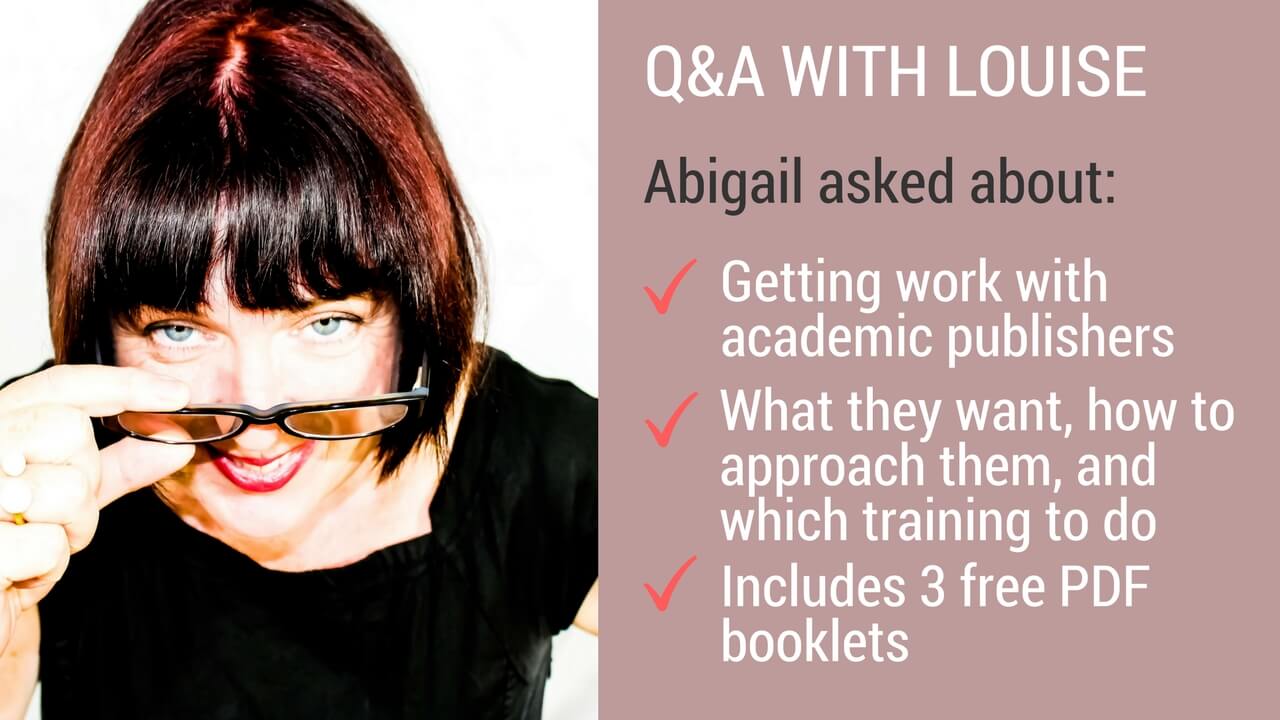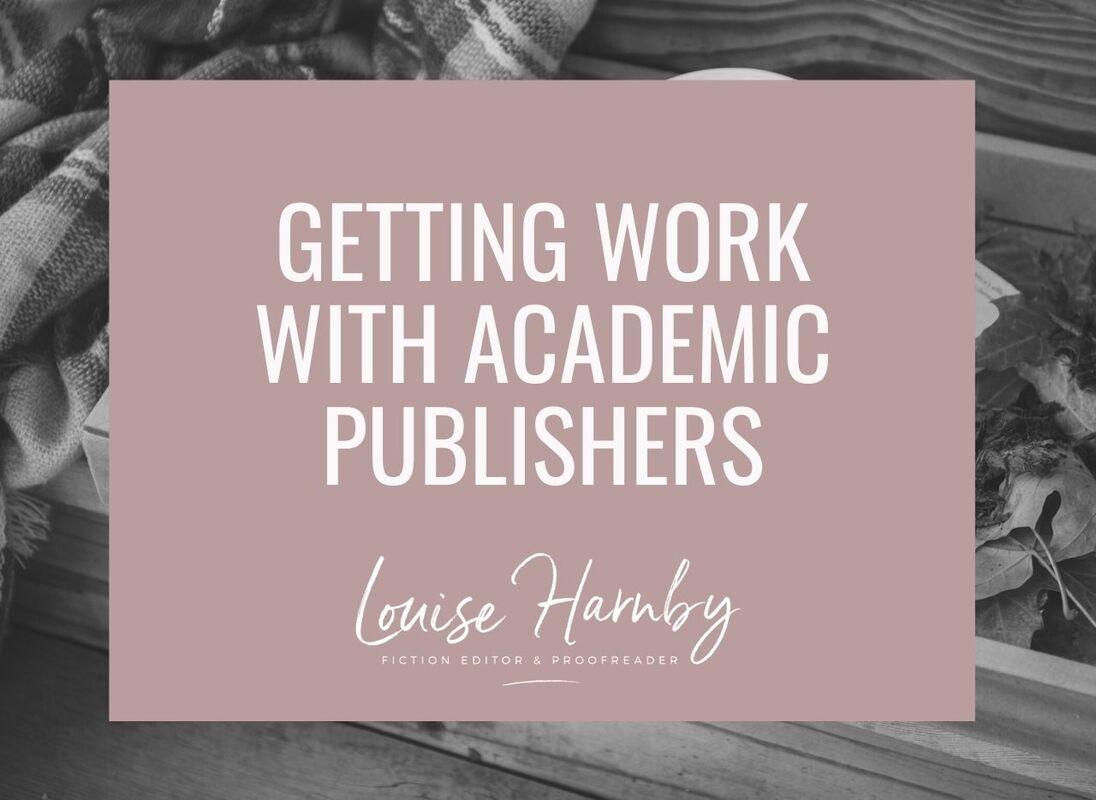|
Abigail is based in the UK and has been proofreading and editing for around five years. Most of her work thus far has come via existing contacts, personal referrals, and a third-party site.
Until recently, that was sufficient. Consequently, she hasn’t spent any time thinking about a website, marketing, or other forms of outreach. Furthermore, the third-party site has changed the service-fee structure so that the work is no longer as lucrative.
She asks: ‘At the moment, I do a lot of academic work, which I love and would like to continue; I just want to secure it privately rather than through third-party sites. In addition, I would like to move away from website copy, blog posts and more generalised proofreading, and start working with publishers on longer and more interesting projects. However, I don’t know where to start, what’s required, or how to approach them. Many thanks for any guidance you can provide!’ Thanks for your question, Abigail! So, something else you mentioned in your email to me is that you’re undergoing professional training. I was really pleased to hear this because I think it’s an essential element in the mainstream publishing market. I’m going to focus on the following:
Why targeting publishers is such a good step Publishers are still the preferred client group for many editorial freelancers. There are several reasons for this:
A quick note on earnings and work stream There’s a lot of talk in the online international editorial community about publishers and low fees. The situation is not straightforward. There is no universal fee for copyediting or proofreading. I rarely work for publishers these days, but when I did I was offered proofreading fees from academic presses that worked out as low as £10 per hour and as high as £40 per hour. It depends on the complexity of the project, the press, the brief, the length, the number of authors, and a ton of other things. After you’ve done a few projects for a publisher, you’ll start to get a sense of how things work and what you can expect to earn on average. Some publishers will offer you a fee of £X per hour, and a guideline for the number of hours they expect the project to be completed in. Some will offer a flat fee for the job. Some of my colleagues (like Liz Jones: see her excellent post in Further reading, below) have successfully negotiated fees when they encountered scope creep. With some presses, I found that I could counter what seemed initially to be a less favourable fee by being as efficient as possible. You’ll also speed up as you become more familiar with a press – their house style, the format of their books, and their preferred professional style manuals and reference systems. Regardless of their fee structure, they do all the project-acquisition work for you, which means you can sit back and focus on the proofreading and editing rather than worrying that your Google Search rankings aren’t as high as you’d like!
Training for academic publishers – what you need to know
In order to ensure you’re fit for purpose with publishers, ask them which style guides and reference systems they prefer, and take time to familiarize yourself with these manuals. Most presses will provide you with a summary of their preferences. Your training course should draw attention to the importance of following a brief. Publishers are usually rigid when it comes to scope, and going beyond the brief without querying first could have detrimental consequences. For example, if you’re training to proofread, you’ll need to practise when to change, when to query and when to leave well enough alone – no in-house editor will thank you for recasting sentences to improve the flow in a proofread. That’s because: it’s expensive to make extensive changes on page proofs; the pagination could be affected; cross-references might be impacted; and the index could be damaged if it’s being created simultaneously. Also check that the training course you’re doing is recognized by the UK publishing industry. You won’t go wrong with the following organizations, though they’re by no means the only ones to consider: Certainly, if you want to proofread for publishers, you’ll need to be familiar with the industry-recognized proof-correction markup language (BS 5261C: 2005). Even if a publisher asks you to proofread on PDF, you might be required (or find it efficient) to use digital versions of these marks. Where academic publishers search Some publishers do search for editors and proofreaders. The SfEP’s Directory of Editorial Services is one port of call. Some also attend the SfEP’s annual conference and the London Book Fair, so those two events are worthy networking opportunities to put yourself on the radar of academic presses. Recently, I was contacted by a publisher via Reedsy. It’s the first time I’ve received a request to quote from a press via this platform, and it was for a fiction title, so I’m not convinced that this would necessarily be a primary channel for you if you want to acquire academic work, but I’m mentioning it just as food for thought. Why going direct is still your best bet My top tip for getting in front of publishers is to contact them direct, by email, phone or letter. The reason why many don’t search online for editorial freelancers is simply because they don’t need to. Build a list of UK academic publishers, then find out the name of the person in charge of hiring – it’s probably someone in the production department – and get in touch with them. You already have lots of experience, and you’ll have a top-notch training course under your belt. I recommend customizing your CV and cover letter/email for each press so that your portfolio of projects sells you as a perfect fit. Read Philip Stirups’ article for more top tips (see Further reading). Don’t put all your eggs in one basket I recommend you build a bank of around ten publishers. If you stick to one or two you could end up in deep water further down the road. If one of those clients were to merge with another, you might fall off the freelance list during the transition. If your other client were to go bust, you’d be scuppered. Having a larger bank of publishers means you have a safety net. It’s likely your publisher client base will grow exponentially; each time you acquire a new client you’ll be more likely to impress another. It’s a small world, and many of the in-house staff know each other. That will work in your favour. Taking academic publishers’ tests Some publishers will ask you to take a test. There are two articles in the Further reading section that offer excellent overviews of how to approach these: ‘The Business of Editing: Editing Tests’ by Rich Adin, and ‘Test Taking Tips For Editors’ by Cassie Armstrong. Asking for testimonials and building a portfolio Are you able to ask current academic clients for testimonials? If so, do so – however embarrassing you find it! This kind of social proof won’t on its own get you work, but it’s one way of demonstrating that you’re capable of fulfilling a client’s brief. I mentioned your portfolio above. If you’ve been in business for five years, chances are you have an amazing project portfolio. Make sure your CV, LinkedIn profile and website reflect your body of completed works. Publishers love to see experience! I hope that brings you a little clarity, Abigail. Good luck with building your new client base! Further reading
Louise Harnby is a line editor, copyeditor and proofreader who specializes in working with crime, mystery, suspense and thriller writers.
She is an Advanced Professional Member of the Chartered Institute of Editing and Proofreading (CIEP), a member of ACES, a Partner Member of The Alliance of Independent Authors (ALLi), and co-hosts The Editing Podcast. Visit her business website at Louise Harnby | Fiction Editor & Proofreader, say hello on Twitter at @LouiseHarnby, connect via Facebook and LinkedIn, and check out her books and courses.
2 Comments
Philip Kelly
18/10/2018 12:44:05 pm
Hi Louise,
Reply
Louise Harnby
18/10/2018 01:14:02 pm
If your existing client base isn't biting, you need to find new ones. What other marketing are you doing, Philip? What's your specialism - non-fiction or fiction?
Reply
Leave a Reply. |
BLOG ALERTSIf you'd like me to email you when a new blog post is available, sign up for blog alerts!
TESTIMONIALSDare Rogers'Louise uses her expertise to hone a story until it's razor sharp, while still allowing the author’s voice to remain dominant.'Jeff Carson'I wholeheartedly recommend her services ... Just don’t hire her when I need her.'J B Turner'Sincere thanks for a beautiful and elegant piece of work. First class.'Ayshe Gemedzhy'What makes her stand out and shine is her ability to immerse herself in your story.'Salt Publishing'A million thanks – your mark-up is perfect, as always.'CATEGORIES
All
ARCHIVES
July 2024
|
|
|
|

















 RSS Feed
RSS Feed





